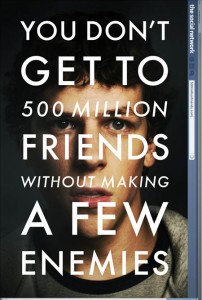film review: the social network
David Fincher’s The Social Network is a compelling film that chronicles the development of the ever-growing phenomenon, Facebook. The networking program currently boasts 500 million members, and is worth over $25 billion, making Mark Zuckerberg, the disputed inventor, the world’s youngest billionaire.
The screenwriter Aaron Sorkin grabbed at the chance to adapt Ben Mezrich’s book titled The Accidental Billionaire into a film, because he was fascinated with the history of Facebook and the characters that it’s based upon. “The themes of the movie are as old as storytelling itself: loyalty, friendship, power, money, envy, social status, jealousy. It’s a story that if Aeschylus were alive today, he’d have written; Shakespeare would have written; Paddy Chayfsky would have written. Fortunately for me, none of those people were available, so I go to write it.” (Sony, 2010)
The structure of the film is somewhat fragmented, cutting from the foundations of the website, to the resulting litigations. Although the story was thoroughly researched and sourced, Zuckerberg refused to provide any personal insights, which meant that Sorkin was forced to work with a series of equally “unreliable narrators” with differing versions of the story. The scenes in the past depict Zuckerberg’s (Jesse Eisenberg) time at Harvard University where he creates the program, and the film follows its quick expansion across the country. Sean Parker (played by Justin Timberlake), the inventor of the illegal music-downloading program Napster, then approached Zuckerberg with two significant suggestions:
1) To drop the ‘the’ from the URL (it was originally named thefacebook.com), and 2) he advised Zuckerberg not to sell advertising space for a substantial amount of time – a philosophy that Zuckerberg was also in favour of. They feared that advertising would kill the integrity and acceptance of the program before it became widespread. Parker therefore played a major role in tearing apart the friendship between Zuckerberg and Albright, who was the original primary financial investor and CFO.
The other scenes in the film follow the law cases that Zuckerberg became intertwined in. The twin brothers Cameron and Tyler Winklevoss (Armie Hammer portrayed both roles) sued Zuckerberg for supposedly stealing their idea the “Harvard Connection.” He was then sued by his former best friend Albright, for cheating him out of his rightful share once the network had acquired one million friends. Zuckerberg is a very interesting figure – he was not in the game for monetary reasons – and Jesse Eisenberg convincingly captures his social awkwardness and unwavering ambition. The final scene in the film is brilliant: after the court cases have been settled, Zuckerberg is seen adding the girl that he appears to love (and who he alienated in the beginning of the film) as a friend on Facebook. The camera focuses on his computer screen as he persistently presses the refresh button every couple of seconds to see if she has accepted his request.
The film explores the struggles for money and power, but also the importance of friendship and love. It is a defining film for our internet-obsessed generation, and is brilliantly acted by the key cast. Ironically, while the aim of the program was to ‘connect’ people, many commentators point to the ways in which technology is in fact pushing people apart. I must admit that I am one of the few people in my age group that does not have a Facebook page, and I suppose this made me even more interested in viewing this film to understand the roots of this popular phenomenon.


